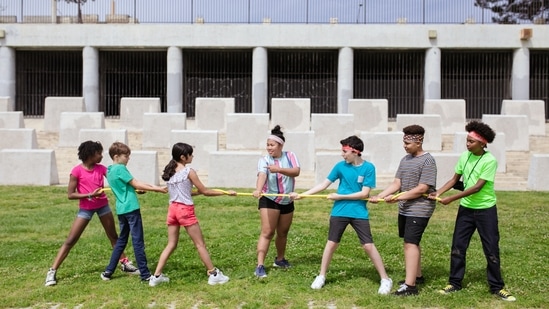Gender equality starts at home. Here are tips for parents to raise feminist kids
As society we are moving towards gender equality and parents have the responsibility to build that awareness in children from younger age itself. Feminism has many aspects and layers that take years of practice to master and the earlier we start, the better world we can build for ourselves and our children.

Gender equality starts at home. Here are tips for parents to raise feminist kids (RODNAE Productions )
In an interview with HT Lifestyle, Dr Kriti Israni, Child Development and Parenting Expert and Founder of Hale & Hearty Kids, listed a few tips for raising feminist kids and teaching gender equality in kids:
1. Modelling behaviour – Demonstrate gender equality through modelling. Kids learn from what they see and observe. Create an atmosphere where family members respect women of the house and their efforts.
2. Role play activities – Encourage to do role play activities with both the genders such as cooking, cleaning, doctor play, firefighter dress up etc.
3. Storytelling – Tap into children’s imagination and tell them fun stories of gender equality that teaches them that all are equal and nobody is better or worse. Eg. Ask them to do simple gestures such as shake hands with boys and girls; tell them stories of how mumma goes to work and how papa goes to work etc.
4. Conversations – Share examples of equality in conversations. As you converse with your child; narrate similar stories once with a boy as main character and once with a girl as main character.
5. Respect – Teach kids to respect women. Use verbal cues and stories to help kids learn it is important to respect women and help them see women as strong and fierce through appreciation, love and gratitude.
6. Sharing – Encourage kids to share toys, meals and perform group activities with both genders
7. Daily chores – Involve both the genders in daily household chores and even in outdoor errands. This way kids learn that no activity is limited to gender.
According to Devina Kaur, radio host and producer and the author of Too Fat Too Loud Too Ambitious, “To raise a feminist is to be a feminist first, set an example, be ready to learn every day and unlearn the old ways of being.” She too added to the list of tips for raising feminist kids and shared:
1. Respect for all – Feminism preaches respect for all, irrespective of their differences. The first step is to teach them that we should respect people despite their shortcomings and ideas. If we treat others with respect, we’ll get respect in return.
2. Non-judgement – Raise your kids to be free of judgments that others may have. We all form some opinions and biases about situations and people, but it’s morally wrong to land on any conclusion without having appropriate evidence. Teach your kids to make decisions based on facts and not age-old myths and prejudices.
3. Equality for all – Feminism is often confused with inequality for boys and men in society. On the contrary, it’s about having equal rights for all people without any discrimination.
4. Fighting gender stereotypes – Unknowingly, we employ some stereotypes that have the potential to leave a bad impression on our children. We have to start by dissolving the gender stereotypes at home so our children feel safe as themselves out in the world.
5. Be sensitive – We have to teach them to be more sensitive, empathetic, and open to talking about their feelings. Feelings and emotions make us humans and there’s growth in accepting them and following what the heart tells us is the right path to follow.
6. Self-knowledge – Growing up, we make a lot of hard decisions, and sometimes, we fail. The journey of life is filled with rose petals and thorns, and the path to self-knowledge includes knowing the good side and the not-so-good side.
7. Self-acceptance – With self-acceptance, we’ve to teach our children to work towards radical self-acceptance in every way possible. Only with this can they take steps to improve and gain perspectives to be a better person in a better world.
SHARE THIS ARTICLE ON






